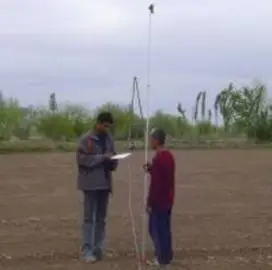ZEF alumnus succeeds in acquiring funds for German-Pakistani research collaboration
September 14, 2011.
Usman Khalid Awan, a former ZEF doctoral student from Pakistan, and currently an Assistant Professor at the University of Agriculture, Faisalabad, Pakistan, has taken the lead in acquiring research funds under the recently established German-Pakistani Research Collaborations Program of the German Academic Exchange Service (DAAD). Together with colleagues from ZEF, he successfully applied to a call by the DAAD with a project proposal on “Improving Irrigation Water Use in the Punjab Province of Pakistan by Raising Flexibility and Integrating Surface and Groundwater Resources”. The project was one of 13 projects selected out of 34 applications for further funding.
ZEF conducted an interview with Dr. Awan during a recent stay in Bonn:
Dr. Awan, what exactly will the program consist of?
Well, I will lead a team of senior researchers from Germany and Pakistan and five Pakistani MSc students conducting their master studies in the context of the project. Aside from doing research, the program will facilitate an exchange of scientists, as well as joint workshops and conferences to discuss and evaluate our research progress and results.
What do you think has contributed to making your application successful?
To be frank, I think my training at ZEF has made all the difference. The DAAD-Call addressed specifically people with a doctoral degree from a German University. Having received my degree from the Agricultural Faculty of Bonn University in May 2010, I was eligible to apply under the program. I am convinced that the way I was educated at ZEF gave me a huge advantage on other applicants. The most important assets of having done your doctoral research at ZEF are in my opinion: ZEF’s interdisciplinary approach gives you some insight in other disciplines and their boundary points with your own research topic and area. Exchange with colleagues from other disciplines has proven to be very fruitful. Another asset is that many students at ZEF are involved in larger research initiatives, such as the project in Uzbekistan, in which I was involved. This gives you not only a broader view on your own research topic, but also an idea of how to manage a project. This experience i.e., interdisciplinary project oriented PhD has certainly given me a competitive edge
<image style="margin-right: 12px" src="http://www.zef.de/fileadmin/webfiles/downloads/press/DSC02294_200_gr.jpg" align="left">
Did your research experience outside of Pakistan play a role too?
Yes, it certainly did. ZEF gave me the opportunity to gather experience in my field of specialization in countries such as Uzbekistan and Australia. As a hydrologist, I was able to compare water management and irrigation schemes in these countries with Pakistan. The water management in Australia and Uzbekistan is demand-based whereas Pakistan’s water management schemes are still largely supply-driven. To convert to demand-based irrigation system, a comprehensive research is required in Pakistan. Now, I have the possibility to actually change something in my country and contribute substantially with my expertise and knowledge to its development.
What about teaching, is it also part of the DAAD collaboration program?
Yes, it is and teaching a next generation of Pakistani academics with my knowledge and experience is something I am really eager to do. The use of GIS, Remote Sensing and hydrological tools in water management is the future of water management in Pakistan. As I got training in these tools, I am looking forward to transfer my knowledge to the young researchers in Pakistan. I can also stimulate people to go abroad to make their own experiences and broaden their academic views. The DAAD program is in fact an addition to the teaching I am doing anyway. They want us to continue conducting actual research and not only to teach. The Pakistani government has invested quite some money in stipends for students like me to go abroad over the recent years. But now since most of them have returned to Pakistan, funds are lacking to enhance research capacities. This is where DAAD gets in with its program. We are very grateful for that. But most of all I thank ZEF for providing me with skills that prove to be so useful for my career and for contributing to a sustainable development in Pakistan.
Facts & figures:
Usman Khalid Awan has conducted his doctoral research at ZEF in the context of the ZEF/UNESCO project in Khorezm, Uzbekistan. He received his doctoral degree from the Agricultural Faculty of Bonn University in May 2010. He is a hydrologist by training and conducted his doctoral research on “Coupling hydrological and irrigation schedule models for the management of surface and groundwater resources in Khorezm, Uzbekistan.” His doctoral research was supported by the Higher Education Commission (HEC) in Pakistan, the German Federal Ministry of Education and Research (BMBF) and the German Academic Exchange Service (DAAD). After finishing his PhD, he worked as a Postdoc at ZEF. In 2011 he returned to Pakistan and started working as a Lecturer at the University of Agriculture in Faisalabad, Pakistan.


